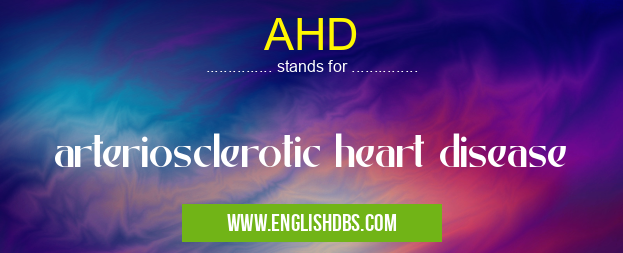What does AHD mean in MEDICAL
Arteriosclerotic heart disease (AHD) is a term that is used to refer to any type of heart condition caused by the hardening and narrowing of the arteries. This hardening, or sclerotic process, can lead to stroke, heart attack, and other serious health issues. In this article we will discuss AHD in more detail and provide answers to some frequently asked questions

AHD meaning in Medical in Medical
AHD mostly used in an acronym Medical in Category Medical that means arteriosclerotic heart disease
Shorthand: AHD,
Full Form: arteriosclerotic heart disease
For more information of "arteriosclerotic heart disease", see the section below.
Essential Questions and Answers on arteriosclerotic heart disease in "MEDICAL»MEDICAL"
What are the symptoms of arteriosclerotic heart disease?
The symptoms of AHD vary depending on the severity of the condition. Common signs include chest pain, shortness of breath, dizziness, fatigue and an irregular heartbeat. If you are experiencing any of these symptoms it is important to see a doctor as soon as possible
What are some risk factors for developing arteriosclerotic heart disease?
Risk factors for AHD include having high cholesterol or blood pressure levels, being overweight or obese, smoking cigarettes, leading an inactive lifestyle and having diabetes
What kind of treatments are available for arteriosclerotic heart disease?
Treatments for AHD may include lifestyle changes such as exercising regularly and eating a healthy diet. Medications such as statins, beta blockers or ACE inhibitors might also be prescribed by your doctor if necessary
Is arteriosclerotic heart disease preventable?
Yes! Maintaining a healthy lifestyle with regular exercise and eating nutritious foods can significantly reduce your risk for developing AHD
Is there a cure for arteriosclerotic heart disease?
Unfortunately there is no known cure for AHD; however there are treatments that can help manage its symptoms and slow down its progression
AHD also stands for: |
|
| All stands for AHD |
